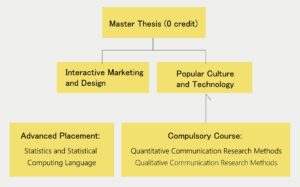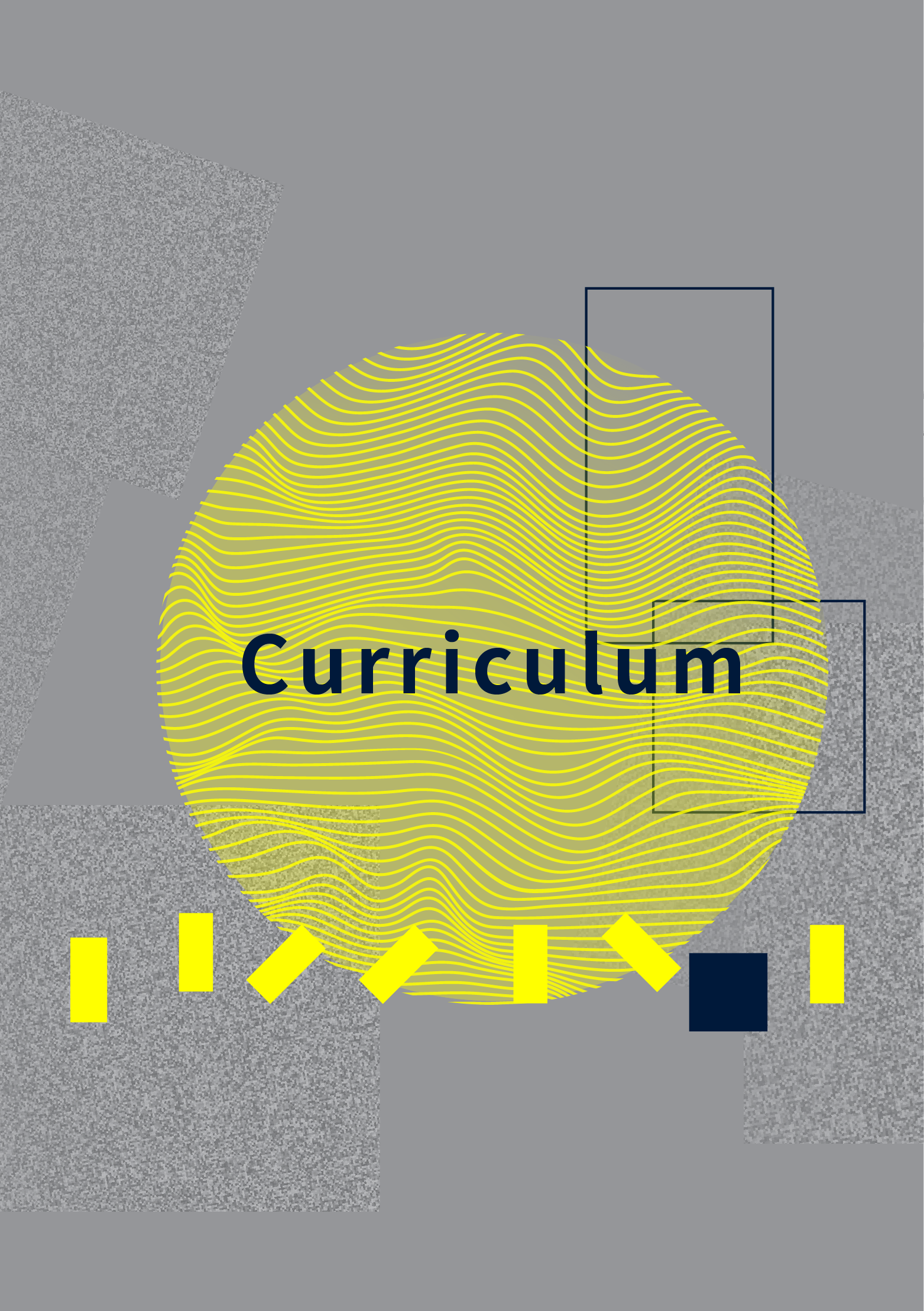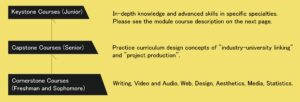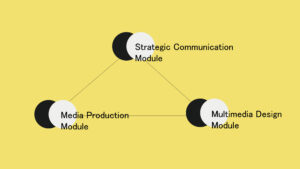Program Regulations
1. These regulations are based on the Article 19 of Organizational Rules of the Master’s Program of Communication and Technology at National Yang Ming Chiao Tung University (hereafter “this program”)
2. Period of study, credit and course requirements
Graduate Students enrolled in this program should complete their degrees in 2 to 4 years. On-the-job students should take 27 credits and are permitted to extend their studies to a maximum of 5 years. The details are outlined in the curriculum design of the Master’s Program of Communication and Technology.
3. Graduate students of non-communication-related majors must take an extra 3-credit course in communication at the graduate level under the supervision of instructors. These course credits are not counted in minimum credits required for graduation. Students can also take 6 credits at the undergraduate level to substitute these 3 credits at the graduate level, provided that they are approved by course instructors or advisors
4. Transfer Out
Students enrolled in this program can transfer out to another graduate program in accordance with their academic interests, provided that they complete transfer-out request forms by the deadline of the add/drop period in the second semester of the first year and get approval from the Curriculum Design Committee. Transferring-out students are not permitted to transfer back.
5. Qualifications Required for Candidacy
(1) Graduate students must pass either an academic article review or exams to advance to candidacy.
(2) Students must complete the Application Forms for Academic Article Review or for Candidacy Qualification Exam in the first two weeks of each semester so that they can apply for candidacy.
(3) Students must meet at least one of the following criteria to advance to candidacy
- i. The student who is qualified as a single – or first – article author by the internal review of this program is eligible for candidacy. If more than one student submits the same article, the first author is awarded 6 points and the second author 4 points. Students not listed as the first or second author in an academic article will not be awarded any points.
ii.The student whose article is published in a domestic or an international journal will be awarded full points. The second author of the published paper is awarded half of the total possible points and the third author a quarter of the total points. The student who is not listed as the first, second or third author is not awarded any points. The detail of point-counting is as followings:
- a. The student whose article is published in the first-rank journal of Taiwan listed by National Science Council (including SSCI and TSSCI) is awarded 10 points.
b. The student whose article is published in a second-rank journal of Taiwan listed by National Science Council is awarded 8 points.
c. The student whose article is published in a journal recognized by the National Science Council is awarded 6 points.
iii. The student whose article is presented in a non-NYCU held conference is eligible for candidacy. If the acceptance rate of this conference is under 50% (proof needed), the single or first author is awarded 8 points, the second author 4 points and the third author 2 points. Students who are not listed as the first, second or third authors are not awarded any points. If the acceptance rate of this conference is higher than 50% (including 50%), the aforementioned awarded points will be reduced to half of total possible points. (The application for an academic article review should be submitted in the school year in which the article is published, accompanied with an application form.)
iv. If the student is awarded 8 points or more, and he or she is listed as the first author of the article internally reviewed, presented in a conference or published in a journal, this student is eligible for candidacy. However, the article reviewed, presented or published must not be submitted in the format of abstract.
v. The same article cannot be repeatedly counted.
vi. For a conference paper accepted in poster sessions, the awarded points are reduced to half of the total possible points.
vii. The student who passes the qualification exam is eligible for candidacy.
(4) The candidacy qualification exam is held once every school year. Students who fail to meet the qualifications for candidacy can apply the following school year.
6. Selection of a Master Thesis Advisor
(1) All full-time faculty members of this program are obligated to advise graduate students. The maximum of advisees for each advisor should not exceed the number based on the following function: the number of admitted students of that year divided by the number of full-time faculty members and adding 2.
(2) Students can request a Master thesis co-advisor who is not affiliated to this program, provided that this person is an assistant, associate or full professor and specializes in the areas relevant to the thesis.
(3) One of the student’s thesis co-advisor must be a faculty member of this program.
(4) Each joint faculty member of this program must not advise more than a quarter of enrolled graduate students. In addition, the Master thesis defense must be approved by at least one full-time faculty member.
7. Application for Master Degree Examination
(1) Graduate students of this program must complete required and elective credits listed in the curriculum design and advance to candidacy before applying for master’s thesis defense.
(2) If approved by the advisor, the student can have the master thesis defense before completing all the program requirements. However, this student must complete all the required courses in the same semester to be awarded the Master’s degree. Students failing to complete the remaining courses in the same semester must have another defense to complete the degree.
8. Master Thesis Requirements
Graduate students of this program must complete a master’s thesis in the APA style. Topics of the thesis must be relevant to the program students study. The content of the thesis should include the following chapters:
(1) Introduction: Background, purposes, significance, research subjects and the organization
(2) Literature review and theoretical framework
(3) Research Methods, rationale and structure
(4) Results
(5) Evaluation
(6) Discussions
(7) References; other related information
9. Defense
The application for the master’s thesis defense must be submitted six weeks prior to the defense. A complete thesis must be sent to master’s thesis committee members one week prior to the defense.
10. The Master’s thesis committee must consist of three to five members. These members must be recommended by the advisor based on their specialties and nominated by the University President. The person sitting in the committee must:
(1) be or have been a full, associate or assistant professor
(2) be or have been an academician by residence or a full, associate, assistant research fellow in Academia Sinica
(3) specialize in some rare subjects and has a great academic or professional achievement
(4) The evaluation criteria for the persons listed in the third qualification should be ratified by the faculty meeting of this program.
11. Students must pass the oral defense to be awarded a master’s degree. The oral defense should follow the rules below:
(1) The oral defense is in principle open to the public.
(2) The oral defense should have the presence of at least three master’s thesis committee members.
(3) The oral defense is convened by a committee member appointed by the University President. The thesis advisor cannot serve as the convener
(4) The student is considered passing the oral defense by obtaining an average grade of 70 or above from a maximum grade of 100. The grading is based on one-time evaluation. However, if more than half of the committee members give the student grades under 70, the student is considered as failing to pass the oral defense.
(5) If the student is proved to commit plagiarism or cheating in the thesis by the committee, he or she is considered as failing the oral defense.
(6) After the oral defense, the student should revise the thesis based on the instructions provided by the committee. Then committee members should review and approve the revised version of the thesis by signing the Oral Defense Approval Form. The final grade given by the committee is considered the student’s thesis grade.
(7) Students successfully defending the thesis by January 31st should submit the Oral Defense Approval Form in the first two weeks of the spring semester. Students successfully defending the thesis by July 31st should submit the Oral Defense Approval Form in the first two weeks of the fall semester. Those who fail to meet the deadlines for submission must enroll in the coming semester following the oral defense. If the student fails to submit the Oral Defense Approval Form by the end of designated study periods, he or she is considered dropping out of the school and will not be awarded the degree.
(8) This program should submit the signed Oral Defense Approval Formto the Registrar Division of the Office of Academic Affairs one week after the student completes the requirements for graduation. Only those who are taking courses in a teacher education program are exempted from this regulation. The student is considered graduating in the semester the Oral Defense Approval Form is submitted. Those who submit the Oral Defense Approval Form as required but fail to complete all the necessary procedures for leaving the school are still considered as graduates but must complete all procedures as soon as possible.
12. The master’s thesis must be written in Chinese or English and must meet the National Chiao Tung University Dissertation/Thesis format specification. Students are required to upload an electronic version of the abstract and full text of the thesis onto the university website one month after the oral defense. (Refer to NYCU Library Abstract, Thesis and Dissertation Electronization Specification for details.) Three paper copies of the thesis must also be submitted to the library.
13. These regulations are ratified by the Curriculum Design Committee of this program, approved by Curriculum Design Committee of the College of Humanities and Social Sciences and recognized by the staff meeting of Dean of Academic Affairs. They are subject to revisions through the same procedures.





